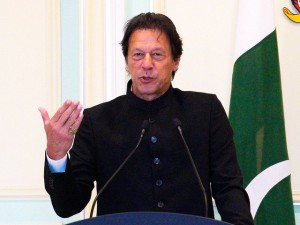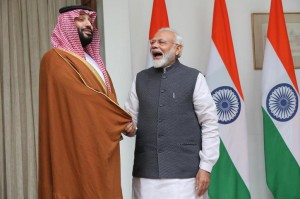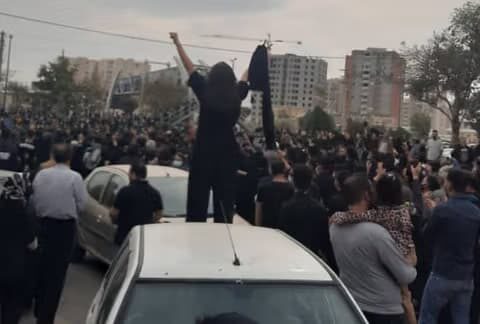If ever there was a geo-political situation that seemed ultimately hopeless and perhaps destined to one day go very badly, it might be the relationship between India and Pakistan.
A situation that has been going on for decades, and in which it seems like the only ‘best-case scenario’ would be a permanent state of Cold War, in which two sides that might never come to terms with each other have to simply tread on the periphery for all eternity, watching each other like hawks.
On February 14th, a suicide bomber killed at least 40 Indian troops traveling through Pulwama, Kashmir. The militant group (Jaish-e-Mohammed), based in Pakistan, claimed responsibility for the attack.
In response, India carried out airstrikes across the border (for the first time in about 50 years), destroying what were claimed to be terror camps under the control of this Jaish-e-Mohammed. Pakistan shot down two of the Indian fighter planes, capturing one of the pilots.
I’ve struggled a little to make sense of this whole affair: the reality of these events, as will be shown here, isn’t clear at all. It’s not clear whether the Indian government’s narrative of the terror attack is reliable; nor is it even clear if the retalliatory airstrikes against the alleged terror camp were real either.
The terrorist act prompted a wave of frenzied outrage across India, with mass calls for vengeance. The Indian airstrikes in Pakistan, meanwhile, triggered a similar frenzied outrage across Pakistan – though it doesn’t take all that much for the zealots on either side to be up in arms.
Much of the lower-class population of Pakistan seems to now be dominated by what most of us would regard as religious fanatics, while India and the Indian state has become increasingly dominated by Hindu nationalist fanatics – both of which makes the perpetually volatile situation between the two neighbouring countries (and nuclear powers) even more dangerous.
Pakistani author, Fatima Bhutto, wrote a New York Times piece highlighting some of the extreme nationalistic response in both India and Pakistan, where zealous ill-feeling has been whipped up and people have been all but cheering for war. Among other things, she highlights social media activity of even Indian celebrities and Bollywood stars, celebrating the airstrikes and joining in the nationalist fervour, with tweets like “mess with the best, die like the rest”.
Many in Pakistan, however, have expressed scepticism about whether Pakistan was behind the attack at all – which is, to be honest, a standard Pakistani response to any accusations.
International media over the passed week went almost into panic mode about a possible eruption of war between the two nations: two nations that, in reality, have never really been all that far away from war. In both cases, the perpetual fear, demonisation or suspicion of the other country, seems almost to have been a defining characteristic of national identity or mood – this has been the case ever since 1947 when this entire mess – including the ongoing problem of Kashmir – was left behind by the departing British Empire.
The whole reason both countries have nuclear arsenals is because of each other. And it’s the fear of nuclear action that, in theory, would prevent either side from risking too much escalation.
Michael Mills, a researcher at the US National Center for Atmospheric Research, helped model the outcome of an Indian-Pakistani nuclear war in a 2014 study, in which he talked about the likely widespread effects that would go beyond the two nations. ‘In that scenario,’ Business Insider explains, ‘each country exchanges 50 weapons — less than half of their arsenals. Each of those weapons are capable of triggering a Hiroshima-size explosion…’
Will it actually descend into war? Probably not: at least not right now.
‘Incidents’ between the two countries are not uncommon: and they usually step back from the brink. But you have to wonder – particularly given the fanatical elements in both countries – if, one day, a fatal mistake will be made.
Some feared that India’s fighter jets crossing into Pakistan to bomb terrorist targets might’ve been that mistake. At present, it looks like a further escalation may be avoided – particularly due to Imran Khan‘s apparently level-headed response to the situation.

Indian writer Raghu Raman, in an article from a couple of years ago, expresses serious doubts about India’s position, writing that ‘For all the chest-thumping, India cannot win a war against Pakistan‘.
Among various reasons for this, he highlights Pakistan’s importance to China. ‘Most worryingly, Pakistan and China have achieved military interoperability, which is the capability of their two armies to execute joint missions against a common target. Decades of mutual cooperation, technology transfer, training, equipment sales, and of course a common enemy, have welded our two adversaries into a formidable joint force… Pakistan has made it extraordinarily difficult for India to make any aggressive move in its south without threatening Chinese interests…’
On the other side of the equation, I noticed the Jerusalem Post publish this article as soon as this current flare-up between India and Pakistan happened, noting the ‘key role’ Israel will play in terms of supplying India with weapons and military hardware. ‘The Indian Air Force struck at terrorists based in Pakistan on February 26 using the Israeli-developed SPICE kit for bombs. With New Delhi seeking to modernize its armed forces, at a cost of hundreds of billions, Israel is well placed to play a key role…‘
The close ties between Israel’s right-wing nationalist government and India’s Hindu nationalist ruling BJP have been established for some time; but the article further tells us, ‘By 2017, India represented up to 49% of Israel’s arms export market, according to the Stockholm International Peace Research arms transfer report.’
Where broader international sympathy would lie if it came to war is entirely unclear.
Pakistan was for many years a key ‘ally’ (sort of?) of the United States in the ‘War on Terror’ (and, before that, in the US-controlled Mujahideen war against the Soviet Union in Afghanistan): though it wasn’t a particularly good ally, and in fact extremism and terrorism is rampant in Pakistan. In fact, Pakistan’s dalliances with both Islamic extremists and the US War on Terror has completely backfired on it, sending much of the country into the Dark Ages and leaving Pakistani citizens frequent victims of mass-casualty terrorist attacks.
It appears to be in no one’s interests for conflict between India and Pakistan to escalate: not internationally and not in terms of the two respective countries either.
There are also claims, as there always are, of the Pulwama attack having been a false-flag.
Such claims are common in Pakistan and aren’t necessarily reliable: many Pakistanis almost reflexively cry ‘false-flag’, as if wilfully ignorant of the extraordinary number of terrorist attacks by extremist groups even within Pakistan itself or of the Pakistani intelligence community’s incestuous relationship various extremist groups over the years and its culpability in various acts of terror, including the assassination of Benazir Bhutto – an assassination that, in my opinion, was the last key event that ensured Pakistan’s descent into the Dark Ages.
That said, it isn’t only Pakistani commentators crying ‘false flag’. Andrew Korybko, an American Moscow-based political analyst, seems to think the same thing.
‘Truth be told,’ he writes, ‘although Jaish-e-Mohammed (JeM, designated as a terrorist group by the UN in general and specifically banned by a few of its individual members in particular such as Russia and Pakistan) claimed responsibility for the attack, it was nevertheless carried out by a native Kashmiri… Fake news abounds about the group’s alleged connections to the Pakistani state and its intelligence services, but the fact is that this was never proven and is actually a perfect example of a weaponized infowar narrative propagated for the Hybrid War purpose of increasing international pressure on Pakistan...’
He continues: ‘India will do its utmost to distract the masses by making it seem like the Pulwama attack was a “terrorist conspiracy” carried out by the Pakistani state as an “act of war” against it even though this event was entirely executed by a local born-and-raised Kashmiri who was driven into desperation by the occupation forces’ abuses against his people…’
Others will refute that interpretation of events.
It’s hard to tell where the truth of it lies.
The terrorist could’ve been operating on his own, without any assistance from any Pakistani agency: on the other hand, this Jaish-e-Mohammed did claim the attack and ‘JEM’ is based in Pakistan. Furthermore, although some deny the all-pervasive Pakistani ISI was responsible for the creation of the JEM terror group, it’s hardly an outlandish suggestion, given the ISI’s history of using terrorist groups (take Pakistan’s well-documented role in the creation and propping up of the Taliban in Afghanistan). And Pakistani agents have been known to infiltrate into Indian-controlled Kashmir.
And yet again, on the other hand, the case has always seemed plausbile that, for example, the infamous Mumbai attacks in 2001 might’ve been an inside job designed to frame Pakistan.
So, the whole thing is so murky that there’s really no way of knowing.
And neither government can be particularly trusted: certainly not when it comes to its activities against each another.
Furthermore, to make things even more dubious, there has been a sequence of reports claiming that India’s strike on the alleged terrorist camp in Pakistan was total nonsense. This has even appeared in the Huffington Post, with the implication being that there was no such terrorist camp in Balakot.
It gets odder yet.
M.K Bhadrakumar, writing in Indian Punchline, also expresses great concern that the Indian government apparently solicited help from Saudi Arabia and the U.A.E to ‘de-escalate’ the crisis. He writes, ‘Make no mistake, this fateful move has grave implications. The whole world knows that these two petrodollar states are the principal sponsors of terrorist groups who destroyed Syria...’

He also cites a Wikileaks cable that seems to confirm both Saudi Arabia and the UAE have been pouring money into that very terrorist organisation (‘Jaish-e-Mohammed’) that India claims was behind the attack in Pulwama.
Again, I can’t really make sense of it.
So… the Indian government decided to carry out very dangerous (potentially catastrophic) airstrikes inside Pakistan to target a terror camp that possibly didn’t even exist there, and then sought diplomatic assistance from two countries who have funded that same terror group…? Huh?
The whole thing also happened to unfold when Mohammad bin Salman was in Pakistan on a state visit, which is even more curious.
However, the timing may also be noteworthy in terms of internal Indian politics.
With Indians scheduled to vote in general elections in April and May, the ruling BJP (the right-wing party of Hindu nationalists led by Narendra Modi), could certainly benefit from the surge in nationalist fervour and ill feeling towards Pakistan: and the Indian airstrikes inside Pakistan would be seen as a show of national strength by the Modi govenrment as the only political power capable of acting decisively to punish the perpetrators.
The Bharatiya Janata Party is the biggest political party in India (and the biggest political party in the world, in terms of membership): but the right-wing party of Hindi nationalists is suspected by many of having dubious agendas and also of having created a web of camouflage over its real history: and is accused constantly of stoking and fermenting xenophobia, sectarianism, religious supremacism and also violence.
In fact, two days ago, leaders from 21 Indian opposition parties convened meeting at the parliament in New Delhi and condemned the “blatant politicization” of the Pulwama attack, accusing Modi and the BJP of being focused on the upcoming election rather than on smart strategy, diplomacy or national security. Among those issuing this condemnation were Sonia Gandhi, Rahul Gandhi, a former Indian Prime Minister and a number of party leaders.
It has been reported that all opposition parties have disbanded their election campaigns in response to the crisis, while Modi and the BJP continue to gain momentum from all the zeal and anger over the terror attack.
I actually wrote a whole article months ago on the BJP and the rise to dominance of the hardline Hindu nationalists: an article which I didn’t get around to publishing, but which will probably be posted up here in the next few weeks. I had been examining that situation in part because I was astonished by the extent to which the extreme religious nationalists in India – including Modi himself – had apparently given up all pretense (even to the extent of deifying the Hindu extremist who assassinated Mahatma Gandhi).
Ashok Swain, UNESCO Chair of International Water Cooperation and professor at the Department of Peace and Conflict Research at Uppsala University, condemned Indian PM Narendra Modi as a “third-grade low life” in response to this flaring up for tension between the two countries. Swain tweeted, “Modi has forced India to wage a war against Pakistan, the sub-continent is under the real threat of a nuclear holocaust...’
Meanwhile, where India’s leadership has been seen by many as consciously exaccerbating the tension and hoping to benefit from it, Pakistan’s Prime Minister Imran Khan made sure the captured Indian pilot was released quickly.
Khan denies that Pakistan had any involvement in the terror attack. That being said, it seems to have long been the case that no Pakistani leader (at least no civilian leader) has ever really had any control over the country’s military or the dubious ISI: meaning, in effect, that someone like Imran Khan would have no idea what the ISI or even elements of the military might be up to.
If even a military dictator like Pervez Musharaff could so lose control of the various machinations going on around him (Musharaff is in exile in Dubai and faces possible execution if he returns to Pakistan), then it is highly unlikely Imran Khan would have any handle on what the notorious Pakistani Deep State is up to.
That Deep State in Pakistan – the hidden network of retired and serving military personnel who take it upon themselves to protect what they consider Pakistan’s vital national interests – is the real and permanent power in that country: not whoever happens to be Prime Minister. Just ask Benazir Bhutto, who was almost certainly assassinated by said Deep State: or her father, the Pakistani Peoples’ Party founder Zulfikar Ali Bhutto, who was hanged for ‘corruption’. Or even the military dictator Musharraf, who had to flee into exile when he was strung up as the sole orchestrator of Benazir Bhutto’s assassination so that the all-pervading Deep State could pretend it had nothing to do with it.
Said Deep State also has a history of collusion with extremist or terrorist organisations.
And yet, again, when it comes to Pakistan everything is so murky and difficult to understand. Because the apparent collapse of parts of the country – assuming (logically) that it wasn’t a sought-after state of affairs – appears to be a consequence of this collusion with extremists over the years. It’s a common backfire when governments or intelligence agencies think they can weaponise extremists and terrorists for their own purposes: just look at the mess the US, UK and others got into with their own jihadists in Iraq, Libya and Syria.
Following Bhutto’s assassination in 2007, commentators (take this Counterpunch piece from that year) have talked about the ‘grave crisis’ unfolding ‘in the event of the progressive collapse of state power in Pakistan, the cumulative augmentation of areas of jehadi autonomy and influence (both within and outside state structures) or the takeover of the state by radical Islamist elements (again, both within or outside state structures)...’
Following on from that long decay, it’s hard to see how any Pakistani officials could say with any certainty that something like the Pulwama attack wasn’t encouraged or supported from within Pakistan, given that there are entire lawless areas of Pakistan where terrorists and extremists operate.
In that context, it would be easy to justify India being fed up of the terror threat from across the border and deciding to take the drastic step of bombing an (alleged) terror camp inside Pakistan. They would argue that, if the Pakistani state can’t exercise order in its house (which it clearly can’t – given the very existence of those lawless regions and the sheer number of terrorist attacks carried out in Pakistan itself), then there’s no reason to think it can exercise control of terrorist activity flowing out across the border.
The problem, again, lies with all the claims that there was no such terror camp in Balakot and that the Indian airstrikes were not accomplishing anything. Which is why this is so confusing.
And those airstrikes could be seen either as a bold act or as an extremely risky act – given that the Indian government had no idea how Pakistan might’ve reacted to that violation of its territory.
Which just demonstrates how much the whole thing is on a knife-edge: and why having two nuclear powers on such an ongoing knife-edge is so dangerous.
The contemporary dynamic seems to be that India’s government is under the control of hardline nationalists and Hindi fanatics, many of whom don’t even recognise Pakistan’s legitimacy; while Pakistan is itself being held long-term hostage by religious fanatics in large parts of its own population, which (possibly with colusion from within parts of the Deep State and intelligence community) makes it virtually impossible for any Pakistani ‘government’ or leader to exercise true leadership or to operate independently of those regressive forces.
That’s a bad situation all around.





Interesting article.
My parents were originally from Indian Occupied Kashmir who then move to Pakistan in the 1940’s. A part of me can’t help but compare the Indo-Pak split with the North- South Korea split.
Both were one country and after meddling by a foreign power (Brits for indo-pak and USA for Korea) they were split and each part is like the sworn enemy of the other.
I wish I could visit Kashmir and it is my mother’s wish to visit her birthplace in Srinagar but I feel enraged and too bitter when I think of possibly going there.
A friend once said that Pakistanis are ingrained from school to hate Indians and Indians ingrained from school to hate pakistanis.
Bet same shit happens in the Koreas.
I tend to think it’s worse than the Koreas, in terms of attitudes. Just from my experience. At least the Koreans aren’t so divided along religious lines.
As the world lurches under the death throes of the American empire, there is another rising threat from the deep fractures produced by this nation’s prior imperial meddling. Will we finally learn the most important lesson of history before it’s too late? Thanks for exceptionally lucid account of what sounds like an insanely chaotic crisis. Just one question because a friend asked me and I didn’t have an answer… is there any possibility that an outside party is actually trying to provoke a nuclear conflict? As a sort of beta-test, perhaps, to learn how limited nuclear war might play out. Is this idea too crazy? (I simply can’t decide any more.)
I wondered about that too: but I don’t know who would be behind it. In terms of British ‘situations’ left around the world, I think we may dwarf America. I mean India/Pakistan, Israel/Palestine, half the Middle East, Myanmar, etc. In fact, wasn’t the Iranian coup in the 50s primarily a British thing too?
I understand that one was an Anglo-American ‘intervention’ under codenames “Operation Boot” and “Operation Ajax” respectively. Instigated primarily to protect the Anglo-Iranian Oil Company (now BP), the coup itself was CIA-sponsored and lead by Kermit Roosevelt Jr (grandson of Theodore). Apparently it had been “pitched” to the Americans by Christopher Steel (not Steele!), who was the No 2 official in the British embassy in Washington (some of these details are courtesy of Wikipedia by the way). Aunty Beeb and the World Service also lent a hand by adding an extra time pip in their broadcast in order to signal commencement of the plan. I think it’s hard to say precisely where the British empire ends and the American one begins and this incident helps to illustrate how very closely aligned they have been.
A microcosm of the planetary situation… in short…